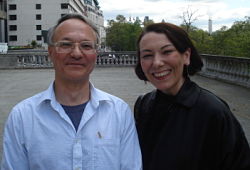100 - Michael Trapp and Caroline Humfress on Ancient Culture and Philosophy
A special double interview with Caroline Humfress (Birkbeck College London) and Michael Trapp (King's College London) celebrates reaching 100 episodes by looking at the cultural status of philosophy in the ancient world.
Themes:
• C. Humfress and P.D.A. Garnsey, The Evolution of the Late Antique World (Cambridge: 2001).
• C. Humfress, "Cracking the Codex: Late Roman Law in Practice," Bulletin of the Institute of Classical Studies 49 (2007), 251-64.
• C. Humfress, Orthodoxy and the Courts in Late Antiquity (Oxford: 2007).
• C. Humfress, "Law in Practice," in P. Rousseau (ed.), A Companion to Late Antiquity (Oxford: 2009), 377-91.
• M.B. Trapp, Maximus of Tyre: The Philosophical Orations (Oxford: 1997).
• M.B. Trapp, Greek and Latin Letters: An Anthology with Translation (Cambridge: 2003).
• M.B. Trapp, Philosophy in the Roman Empire: Ethics, Politics and Society (Aldershot: 2007).
• M.B. Trapp (ed.), Socrates from Antiquity to the Enlightenment and Socrates in the Nineteenth and Twentieth Centuries (Aldershot: 2007).






Comments
Marcus Porcius Cato
While listening to the podcast today I remember we had to translate at high school some parts of Marcus Porcus Cato, Cato the Elder. He was strongly against the Greeks, who, he said, claimed one day one thing was true, while the next day they 'managed' to prove the opposite. He considered it a threat agains Roman morals.
In reply to Marcus Porcius Cato by Ruud van der Weele
Cato
That sounds like it must be an allusion to Carneades' performance during the embassy of Greek philosophers to Rome - he argued on both sides of an issue on consecutive days. I mention this somewhere in the Hellenistic episodes (I guess the ones on Skepticism).
In reply to Cato by Peter Adamson
Cato
Peter, I have to confess I began the series with the Neoplatonists. I will have to listen to the episodes before Plotinus for sure.
Kind regards,
ruud
Great podcast!
A few thoughts.
First, the James Brown album you must have is Hell. Highlight track 11 - I Can't Stand It '76
Second, my favourite Buster Keaton moment is in Daydreams where he's trying to evade a policeman. The policeman sees him, so Keaton begins walking briskly, then a bit faster, then they both break into a full sprint all while being tracked, almost perfectly, by a moving camera. Of course they both stop at an intersection, to let traffic by, before resuming their chase.
Third, I know what you're thinking, he's going to say something about girafes. I know little about giraffes, though they seem very nice.
I will say thank you for a brilliant podcast. The episodes up to the end of the Stoics were fabulous. I think the source material was a little less interesting for me after that. Some of the pre-Socratic stuff was crazy. Parmenides on everything being being and there being no non-being was good, if problematic. I read that as like the view that everything is a part of the fabric of space time, whether planets, people, vacuums or giraffes. I had too.
Thanks too for grouping the episodes into ZIP files. Very convenient. I'm here at episode 100. I think I'll listen to the Indian ZIP file next. Any plans to do something similar for China? I have a fondness for Mozi.
Great podcast and good luck on making it to the end.
In reply to Great podcast! by Daydreaming
JB etc
Thanks for your lovely note! You're right, I do have "Hell" (but then I have a lot of James Brown). My favorite Buster Keaton film is actually the short "One Week," but it's hard to choose.
As far as China... yes, but only vague plans, since it looks like after classical Indian philosophy I will be doing African philosophy. But, some day I hope!
I know absolutely nothing
I know absolutely nothing about African philosophy, even that there was any. As a black person perhaps I should. Maybe it will be about things like colonialism and Pan-Africanism. I look forward to listening to it!
Add new comment